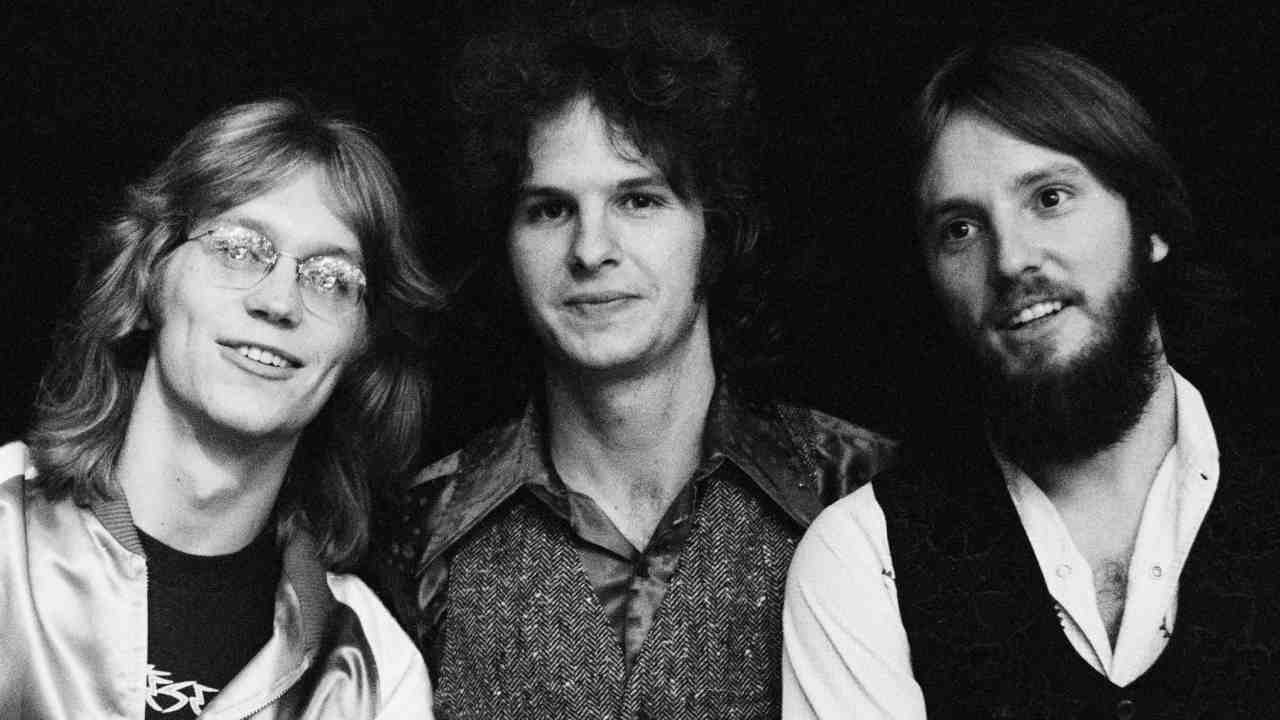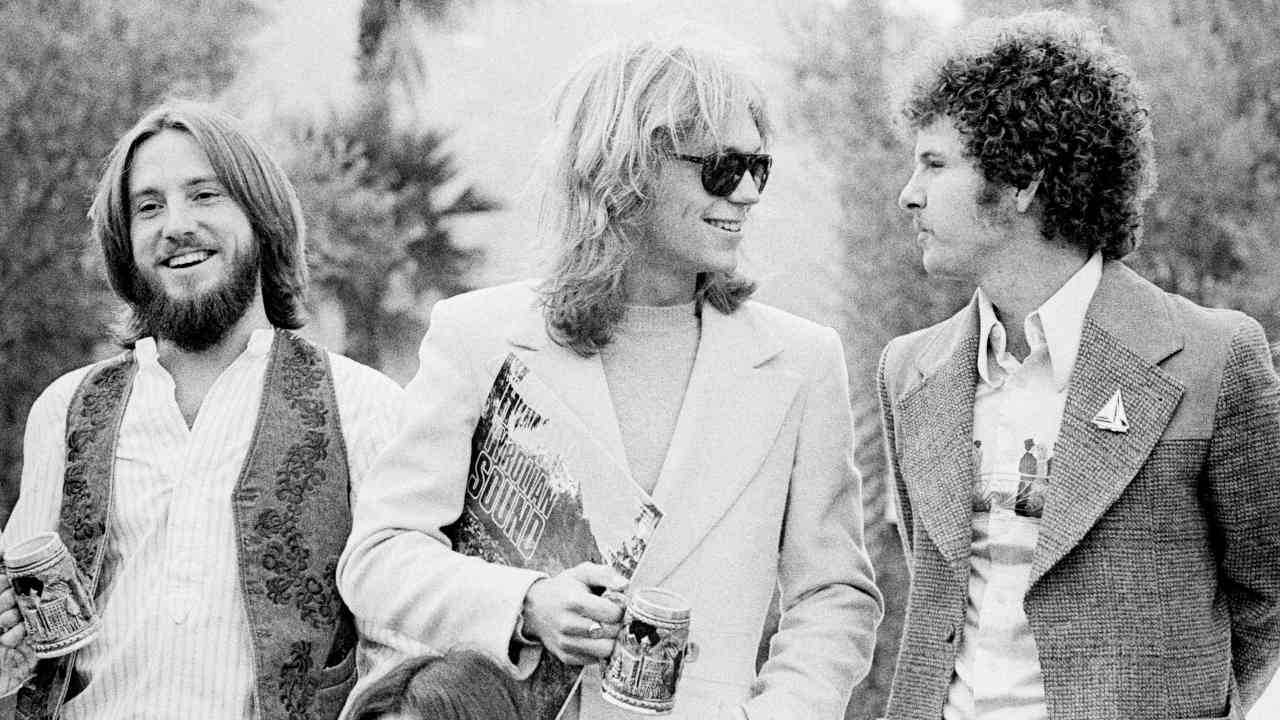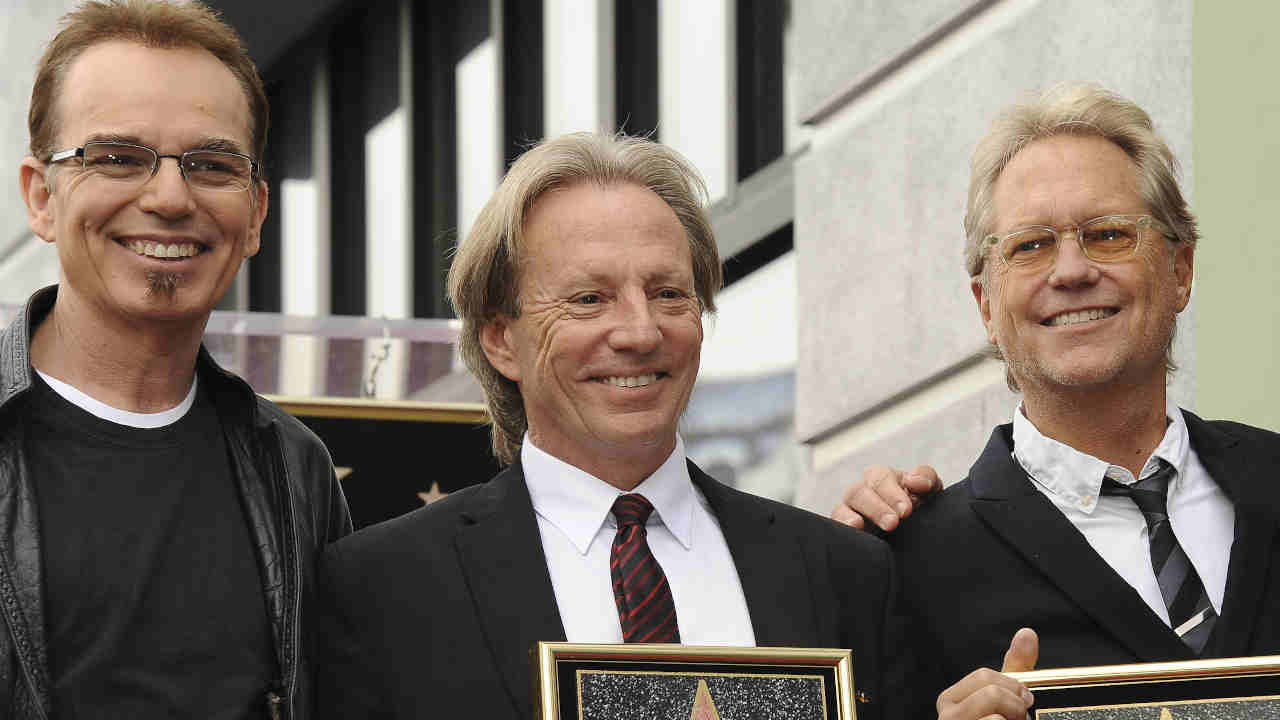
They won’t leave him alone. It’s the summer of 1971 and Martin Wyatt, head of A&R at the new London arm of Warner Bros, is being plagued by phone calls.
Both record producer Ian Samwell and DJ/talent-spotter Jeff Dexter have been ringing on a regular basis for some time now. They’ve been nurturing this hot new American trio, they explain, and Wyatt needs to hear them before anyone else does.
Eventually he agrees, but unfortunately the demo tapes aren’t of the best quality. In the end, he asks the fledgling group to come over to play for him, live in his own personal office.
“We did it about five o’clock on a Friday evening,” recalls Wyatt. “The three of them came in – very nervous and ever so young. They sat there in front of me with their guitars and played me I Need You. It was so beautiful that I had butterflies in my stomach. Then they played me a couple of others.
“Afterwards, I stayed very cool about it all and asked where they were up to. They said they owed someone money for their guitars. So I said, ‘If I give you some money, in lieu of settling your debts, you can come back next week and we’ll sit and talk.’ Then they left, at which point I went straight to [Warners head] Ian Ralfini’s office next door, literally jumped in the air and said, ‘You won’t believe what I’ve just heard! These kids are great!’”
A short while later the threesome, who called themselves America, returned and played him the beginnings of another new tune, Desert Song.
“It was a rough treatment,” says Wyatt, “but I told them I loved it and could they go and finish it. When they came back, it sounded fabulous.”
The song in question was a winsome acoustic travelogue by band member Dewey Bunnell, now titled A Horse With No Name. By January 1972 it was at No.3 in the UK singles chart, while their self-titled debut album was on its way to the upper reaches of the LP listings. Within two months, both single and album were sitting atop the US charts. America were the newest sensations on the block.
The breezy melody and sun-caked harmonies of A Horse With No Name typified the group’s soft-rock sound. A nostalgic paean to a real or imagined past, it was infused with the same turn-of-the-70s ecological spirit as Neil Young’s After The Gold Rush. Bunnell’s voice was eerily similar to Young’s, while America’s dreamy otherness owed much to Young’s sometimes-compadres Crosby, Stills & Nash.

Such comparisons weren’t lost on others either. Hard-nosed rock critics may have been quick to label them as counterfeit Canyon boys, but America’s wholesome appeal was undeniable.
“They looked like really fresh, unscarred young people compared to the others,” remembers Wyatt. “Crosby, Stills, Nash & Young looked like they’d been out there and had a life, but these guys were really talking about young love and things. And it captured everything. That first album sold 11 million copies in America, which was a frightening level of success for a debut record.”
It was the start of a golden career. In their 70s heyday, America turned out million-selling albums with astonishing regularity. Such was their scoring rate in the US that they were able to issue a greatest hits package, History, as early as 1975. The compilation has since gone multi-platinum.
The British record-buying public could be forgiven for dismissing America as one-hit wonders, but the US charts were peppered with Top 10 singles like Ventura Highway, I Need You, Lonely People, Tin Man and a second No.1, Sister Golden Hair. George Martin leapt at the chance to produce them and FM radio adored them, as did the hordes who serially packed out arenas throughout the States. Among the country-rock hierarchy, only The Eagles could outsell them.
All of which made the band’s strong English affiliations all the more intriguing: the group, after all, were formed in London by Bunnell, Gerry Beckley and Dan Peek, all sons of US servicemen stationed overseas on military bases.
“I think because we were all literally the same age and had come from the same background, we had a common bond,” explains Bunnell today. “We shared this transient lifestyle, and that’s one of the elements we brought to the group. Dan had lived in Pakistan and Gerry had lived in Germany. I’d only been around the US, but we also had these English roots: Gerry’s mother and my mother were both English.”
The trio bonded over music at the London Central High School, which catered for the children of American military personnel, at the back end of the 60s.
“The British Invasion had forever changed the rules of music,” Peek told me in 2009. “Musicians weren’t taken seriously unless they could write songs. The Beatles, The Rollng Stones, The Move, The Hollies and so many other bands had raised the bar for everyone.”
Peek, Bunnell and Beckley had started out rearranging current Top 40 hits in a band called The Daze, but by 1970, after Peek had briefly returned home to the US to attend university, they had grown altogether more serious. Melodic, acoustic-driven folk-rock was in the air.
“American music began to make huge inroads into the British and European music scene,” continued Peek. “At that point, the three of us had gotten back together, formed a trio and were writing our own songs heavily influenced by the North American music invasion.”
Today, Beckley explains how it actually went much deeper: “It all came from that Rubber Soul era, where I noticed The Beatles playing in a more acoustic fashion. So it goes back way before Crosby, Stills & Nash and James Taylor. The Beatles had great harmonies, and harmony goes back long before the so-called ‘singer/songwriter’ era. We were real Beatles freaks. And of course The Beach Boys were important too. So you had these two great wings of creativity.”
The band lifted their name from an Americana jukebox at the base cafeteria in West Ruislip, where Peek and Bunnell worked as dishwashers. Getting the group noticed was another matter, but first they had to refine their sound.
“In the early days we’d rehearse all the time,” recalls Beckley. “In fact we ended up rehearsing in Dewey’s car because we liked how the sound was in there, the acoustics.”
They were perfectionists to the last detail. Remembered Peek: “From the summer of 1970 until our first album was released in ’72, we rehearsed four hours or more per day. And many days were spent rehearsing in Dewey’s Morris Minor. By then we’d driven everyone we knew demented with the constant repetition of the songs and parts we were working out. The car was actually a great space to practice as it had an immediacy and closeness that helped us really hear the intricate harmonies and guitar licks we were fine-tuning.”
For a time they rented out an old farmers’ cottage in Chipperfield as a practice space. There was a steady trickle of live bookings too.
“I remember playing a few gigs at the Roundhouse in London, one of which was with Pink Floyd,” says Beckley. “They were doing Atom Heart Mother with a 90-piece orchestra and choir, and then there was me, Dewey and Dan, sitting on three stools playing acoustic guitars. I was talking with Roger Waters about that gig not so long ago. He still remembers it well. It was pretty hard to forget.”

Says Bunnell: “We each had two or three songs in our pocket for the first album. A guy at Middle Earth took us under his wing first, then when Jeff Dexter came on the scene, he was able to get us on the bill at the Roundhouse. Before we knew it we were suddenly thrown into a real gig, where we were making £15! Jeff’s roommate was Ian Samwell, who was with Warner Bros.”
After striking the deal with Warners and in-between support dates with Brinsley Schwarz, America set about recording their debut LP. Any new songs would be tried out first at Samwell’s flat. One of those was A Horse With No Name, which Bunnell had written in one fell swoop while staying with a friend in Staines. It was a composition that partly drew from Bunnell’s childhood memory of living at the Vandenberg Army Base in the Californian desert, along with his fascination for the acoustic tunings of Joni Mitchell and CS&N. Peek and Beckley immediately loved it and began working out the harmonies while Bunnell cooked up a neat guitar solo.
“All along, I Need You was earmarked as the first single,” he explains. “It had a classic standard quality to it. Then when we delivered everything at the end of the recording session, Warners said, ‘Yeah, these are all well and good, but have you got any more?’ So they put us in this farmhouse studio in Cornwall, which I think was run by ex-members of The Crazy World Of Arthur Brown. And out of that session we did four new songs, one of which was A Horse With No Name.”
The others, incidentally, were Submarine Ladies, Peek’s wonderful Don’t Cross The River and Everyone I Meet Is From California. Not bad for a week’s work.
So how exactly did the band go about fielding accusations that A Horse With No Name was little more than a Neil Young/CS&N rip-off?
“I really felt like nothing was contrived,” answers Bunnell. “We weren’t trying to be imitators. We were truly inspired by that music, just as we had been before by The Beatles and The Beach Boys. We were reflections of our generation and the whole hippie thing. And Neil was really a big spokesperson for that.
“I didn’t expect some of the backlash after its success. Had the song just died on the vine people would have been more inclined to treat it differently. But then you get the Neil fans, who were rabidly protective. And, of course, there’s the whole thing about the timing, with us knocking Heart Of Gold off the top of the charts.
“It was ironic that, after all this, we moved back to the US and were managed by David Geffen and Elliot Roberts, whose crown jewels were Crosby, Stills, Nash & Young. Even to this day, there are people who think A Horse With No Name is a Neil Young song.”
It didn’t help that promoters used the association glibly too. An advertisement in Boston for America’s first US tour of 1972 stated, somewhat maddeningly: ‘America, Horse With No Name – They’ll make your little Heart Of Gold rush.’ The band became even keener to prove they were no one-trick pony.
“All three of us could write songs and also sing lead,” says Beckley. “And that turned out to be a very helpful dynamic, with each one of us having an identity. So even though A Horse With No Name was a huge hit, we followed it with I Need You. That immediately signalled the fact we had a variety of sounds and timbres. On the other side you have the dynamic of competition and each of the three of us trying to get our share of songs on the albums. Early on we more or less said, ‘Let’s have three songs each, then do a cover song.’ It was typical American democracy.”
The hits did indeed keep on rolling, though success often arrives at a price. After the band moved to LA and signed with Geffen and Roberts, the first signs of friction began to appear.
“I first met Gerry when he was 16 years old and he was the most self-confident person I’d ever met,” recalled Peek. “But as the band soared to greater and greater heights he began to have a major crisis of confidence. He projected the attitude that he was going to be the big dog in the band, and when Dewey and I made significant contributions to our success, I think it rattled him. All three of us are enormously competitive and it was a high-stakes game we were playing. What had once been an all-for-one camaraderie evaporated. It could get pretty ugly. Gerry was constantly threatening to quit the band, almost from the release and success of A Horse With No Name.”

1973’s Hat Trick, America’s third album, failed to achieve the sales figures of their debut and its immediate predecessor, Homecoming. So the band turned to their heroes The Beatles for inspiration, drafting in George Martin as producer and arranger. It paid off too. America’s wind-in-the-hair harmonies now came framed by strings and piano, giving their music a more stately, chamber-pop feel on 1974’s Holiday. There was more than a whiff of Eleanor Rigby to songs like Glad To See You, while Hollywood and In The Country were smart examples of West Coast AOR.
Four more albums with Martin followed, along with the now-customary sell-out tours of the States. But the pressure was beginning to tell. With success came the inevitable supply of drugs and booze.
“I’ve stopped drinking now, but when I stopped I noticed a lot of booze references in my songs,” reflects Bunnell. “But it wasn’t really true of the drugs. I never overtly used any drug references, but I suppose there’s a certain aspect of the dreamy quality of the lifestyle of the hippie scene that was woven into the dialogue of the day. To some extent the listeners were more stoned than the writers. A lot of them were really ripped. We did our share of enjoying the folly and fruits of our generation, but it was no big deal.”
But by the mid 70s it had become a big deal for Peek. America’s relentless touring schedule was slowly grinding all the joy out of the music, at least for him. The countercultural fallacy that all the world’s ills could be cured by a fat spliff or a hit of acid was something Peek admitted buying into wholeheartedly.
“There was a certain amount of naïveté regarding drug use in the 60s and 70s,” he told me. “I did use drugs – hash, marijuana, cocaine, quaaludes, alcohol and tobacco. In retrospect, I sincerely wish I’d been a teetotaller.”
He quit the band in May 1977 and became a born-again Christian, noting in his 2004 autobiography An American Band that “as hard as the break-up had been, there was an unwritten if not unspoken sense that it was all for the best”.
Today, Beckley is philosophical about Peek’s departure. “I would say drug use in the band was no more than recreational until Dan’s departure. Then we had some real issues with that. We try to keep Dan’s departure in the most positive light. After he left the band, he went on a life-changing trajectory, but he had to go because it just wasn’t good for his health.”
Bunnell and Beckley pressed on as a duo. A fleeting return to the Billboard Top 10 arrived in 1982, by way of Russ Ballard’s You Can Do Magic, but America’s glory years were already well behind them. There’s been sporadic studio activity since, most recently 2007’s Here & Now (their first major-label offering in 20 years) and this summer’s new covers collection, Back Pages. And America have always made a fair crust as a live draw, their profile boosted by the praise of a new generation of US musicians who’ve found much to admire in the band’s rich back catalogue. Here & Now included contributions from Adam Schlesinger (Fountains Of Wayne) and James Iha (Smashing Pumpkins), alongside the likes of Ryan Adams, My Morning Jacket’s Jim James and various members of Nada Surf. As Iha pointed out around the record’s release, there was always a timeless, disarming sincerity to America’s music.
Dan Peek died in 2011, aged 60 , but Bunnell and Beckley continued delivering their billowy AOR to the faithful.
“People expect me to be sick and tired of A Horse With No Name,” says Bunnell, “but it was our introduction to the public eye and we’ll always be associated with that. Regardless of anything else we do, it’ll always be a case of, ‘Oh, you’re the one with that horse thing.’ There was a time in the early 70s where we did become sick of it. We were heady young guys and thought it was already old, so we took it out of the live show. But literally within three shows, we had promoters pulling their hair out and saying, ‘What are you doing?’ America is a band that evokes strong memories and that song is part of who I am.”
Originally published in Classic Rock Presents AOR issue 4







